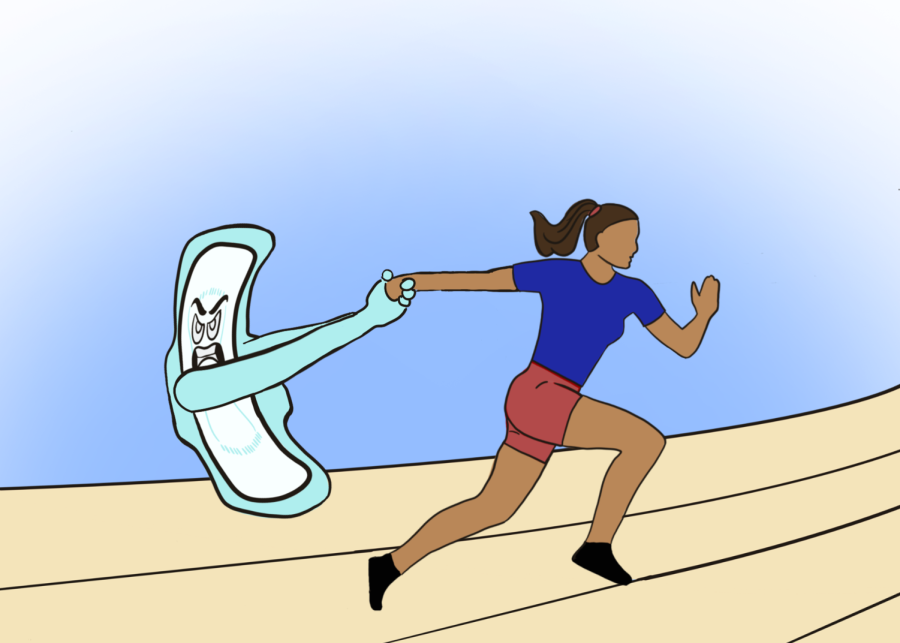Female athletes versus menstruation
Graphic illustration by Vidushi Upadhyay
Periods are natural monthly discharges of blood from a female’s uterus that typically last for two to seven days, and often bring on abdominal cramps, mood swings and muscle aches — the severities of which vary from person to person.
April 10, 2023
About half of the Lynbrook student body experiences “that time of the month”: that time of the month when you may feel more moody; that time of the month when your joints may ache; that time of the month when your menstruation cycle begins. And if you’re also an athlete, you’ve likely endured countless practices and games darting through the pain of cramps and discomfort of menstrual products.
Periods are inescapable. They are natural monthly discharges of blood from a female’s uterus that typically last for two to seven days, and often bring on abdominal cramps, mood swings and muscle aches — the severities of which vary from person to person. Years of experience have taught female athletes how to cope with their periods, but this natural biological process inevitably poses hindrances on the playing field.
“Cramps can hold me back from performing my best as a cheerleader,” junior Ayanna Beberg said. “When we’re stunting, we must be really focused. Any period symptoms in general can be distracting, and thus mess up the entire stunt.”
The most common and painful among symptoms are abdominal cramps; many female athletes often take medications such as ibuprofen to mitigate its discomfort. Symptoms vary; stronger cramps may hinder athletes from exhibiting their best performance or even participating in practices and important competitions at all.
“Sometimes men underestimate how bad period pains can be,” said senior Kate Lee, who has been a competitive swimmer for 10 years. “I get really bad cramps, and most of the time my coaches have been pretty understanding, but there have been times when I’ve asked for breaks because of the pain and they tell me that I can power through it.’”
Fluctuating hormone levels during menstruation lead to changes in energy levels and mood, often leading to greater fatigue and debilitated overall performance.
“My period makes me feel more tired in general and sometimes even disgusting,” freshman Suzanne Das said. “When I play tennis on my period, I try to eat a lot more to boost my energy.”
One particular hormone that decreases during the menstrual cycle is estrogen, a sex hormone that is important for maintaining bone health; lower estrogen levels can increase the risk of bone injury.
“It’s different for every student — we all have different bodies,” freshman PE teacher Lauren Blazek said. “I wouldn’t say exerting yourself to extreme limits when you’re on your period is a good idea, but I always suggest staying as active as you can by modifying exercises or taking it easier.”
As athletes get older, they learn about their bodies’ unique responses to periods. Lee, like many other female athletes, has learned to accept and play through the unavoidable pain and inconvenience that come with periods.
“When I’m on my period during an important competition, I tell myself that there’s nothing I can do to stop it and that I just need to accept it, and try my best to move on,” Lee said.
Most athletes have an array of menstrual products to choose from — everyone has different preferences. However, watersport athletes must learn to use tampons, which is a product many avoid since it gives rise to the possibility of contracting toxic shock syndrome, a fatal bacterial infection from leaving in a tampon for more than eight hours. Pads are not an option for these athletes because they absorb pool water, so those who are uncomfortable using tampons must put their sport on hold throughout the entire duration of their period.
The discomfort of menstrual products is also something female athletes have learned to accept and disregard.
“Using pads during my matches is definitely uncomfortable, especially when they become weirdly oriented,” Das said. “It’s really annoying, but I just cope and move on. Sometimes when I’m rallying I even forget about the fact that I’m on my period.”
To mitigate the taboo against period talks, all Lynbrook PE teachers discuss periods at the beginning of each school year, hoping to establish a more comfortable environment for female students. Students on their period are given permission to take breaks from classes and walk laps around the track as an alternative.
“We tell them that we understand,” Blazek said. “I’m a woman as well, and I know that periods come once a month for all girls. I hope this taboo gets eliminated soon because periods are nothing to be embarrassed or ashamed of.”
Many athletes have fortunately found fitting environments to comfortably grow as female athletes.
“I’ve always felt comfortable talking about periods with my teammates because we’ve all been open about it ever since we first got them, so it’s somewhat normalized for us,” Lee said. “I think it’s important to have an environment where you can feel comfortable and not embarrassed talking about periods.”
Period discomfort doesn’t stop female athletes from doing what they love — it is among the many other aspects that make female athletes strong.
“My periods never hold me back from trying my best,” Das said. “Although I’m not feeling the best mentally or physically, I still try my best just because I love my sport.”




































































